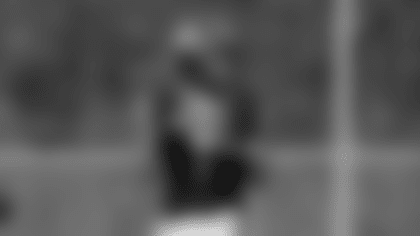The views and opinions expressed in this article do not reflect those of the team.
HBCU players have been an integral part of the NFL's history. From Jerry Rice to Larry Little and Walter Payton, the league has been shaped by talented athletes from historically black colleges and universities.
For the Washington Commanders, this fact should be familiar to them. Doug Williams, a Grambling alum, guided Washington to its second Super Bowl victory with an impressive performance, taking down the Denver Broncos with 340 yards and four touchdowns.
In anticipation for the 2022 NFL Draft and in honor of Black History Month, Commanders.com will be highlighting some of this year's HBCU prospects. We're starting things off with Bowie State quarterback, DJ. Golatt.
The first thing Bowie State offensive coordinator Matt Goggans noticed about quarterback DJ Golatt was his confidence.
Golatt, who joined the Bulldogs as a graduate transfer after spending the first portion of his career with Morgan State, did not give off the appearance of someone who was still trying figure out college football. Based on the way he could talk through different offensive schemes and philosophies, Goggans felt like he was speaking to another coach.
"He's a guy that understood what the purpose and the intent of the play call was," Goggans said. "He understood to know your matchups and where to go with the ball and try and get the guys that we wanted to the ball as it's called within the play scheme."
Golatt made life easier for Goggans, who was hired to the Bulldogs' staff a week before camp began, as he directed the offense in his first season on the team's coaching staff. Golatt's knowledge allowed him to act as a second play caller, which in many ways was a calming force.
It also helped that Golatt, a grad transfer from Morgan State, possessed rare athleticism that allowed him to run the offense at a high level. The blend of football I.Q. and playmaking ability gives Goggans confidence that Golatt is ready for the professional game.
"He's a guy that if he gets in there, he'll impress [scouts] with the depth of knowledge he has of the game."
Bowie State prides itself on being a quarterback-driven, pro style offense. They rely on the quarterback to identify mike linebackers and check protection schemes at the line of scrimmage while also giving them some freedom to call some quick plays in a similar fashion to what fans would see at higher levels of college football and the professional game.
In other words, if a quarterback does not have the knowledge to run the system, things will likely be difficult for them.
Golatt did not have those issues, because he already had experience in several different schemes, from run-pass-option concepts to more traditional drop back styles. That made it easy for Goggans to work with Golatt, who was clearly ready to take advantage of his opportunity to be the starting quarterback.
"Having a guy that could protect the integrity of the play, protect the scheme, was huge," Goggans said. "And he got better as the year went on as well, just getting guys in the right spot."
Goggans could see that steady growth on the field, although things started out a little rocky in the season opener against New Haven, who went into the Week 1 matchup ranked No. 16 at the Division II level. The Bowie State offense struggled for most of the day with only one touchdown on the board approaching the halfway point of the fourth quarter.
Then the Bulldogs went on a tear that saw them score 20 points in eight minutes, and much of that was credited to how Golatt directed the offense. He took what the defense gave him and changed up the protection scheme to give himself more time in the pocket for longer developing routes.
Those are the kinds of things, Goggans said, that people do not find in many college quarterbacks.
"Just his ability to identify that from his film study, from his meeting time, from looking at a scouting report...is huge," Goggans said. "Because again, it protected some plays, and he really led that fourth-quarter comeback victory."
Golatt has no problem hitting targets on those longer routes, because he has what Goggans referred to as a "live arm." He can flick the ball 40 yards downfield with ease without requiring much effort from his lower body.
So, Golatt can make all the throws needed to operate as a professional quarterback, but Goggans wanted to make sure he was not relying on his arm completely, which is a common problem for quarterbacks who have unique arm strength. Goggans told Golatt that incorporating his whole body into throws would make the more difficult throws easier to make.
Goggans did not want to overcoach Golatt, but he did not want Goggans to be robotic, either. Golatt took those lessons to heart and spent extra time mastering his footwork.
"We're trying to clean up the body mechanically so that those throws you felt you had to really rip it with your arm, you can naturally make," Goggans said. "So, let's make sure we're throwing with confidence and with ease, because that ball's gonna fly out of your hands."
Golatt also has the luxury of being able to use his legs when plays in the passing game were not there. Goggans is not going to tell a player to avoid using his athleticism, but he did want to make sure Golatt understood that the priority should always be to win from the pocket first.
"We all sat down and I explained to him, 'Hey, listen, if we all wanna be professionals...then we wanna try to win in the pocket and let athleticism extend or make that play when they take the throw away,'" Goggans said. "Let's find ways to work through it and create the patience and or the discipline to work through your first, second, third progression, fourth progression."
Golatt was "very welcome" to that philosophy, Goggans said, and that is where his knowledge of protection schemes helped him. He was able to protect himself and knew how to avoid pressure in the pocket.
At the same time, though, he knew where he needed to escape if things broke down.
"And again, that's a tribute to him watching game film, studying, knowing the opponent, knowing the pressures and where they bring stuff and knowing where to attack and how to attack different defenses," Goggans said.
Golatt's next opportunity to prove himself to teams will be at the HBCU Legacy Bowl in New Orleans on Feb. 25. It will be a chance for Golatt to show off all the knowledge and athleticism that he has built throughout his college career.
Goggans has confidence teams will be impressed with his quarterback.
"He does have a passion for the game, and he loves what he does," Goggans said. "The competitiveness shows up not only on the field, but in the meeting room, weight room, all of those things. He brought a lot of leadership to a team that was relatively young in a lot of spots. It was something that helped not only myself as a coordinator and his position coach, but collectively as an entire team."















